Love, Skala Style
Click on pictures to enlarge
THE VIZHNITSA REBBE MAKES A SHIDDUCH
Hersh Eliyah Wiesenthal and Ethel Weissman (ca. 1872)
| My grandfather Yosef Leib Wiesenthal went to a rebbe, the Vizhnitsa rebbe. And my other grandfather Moshe Dov Weisman, from Semanov [near Trembovla] went to the rebbe too. And they got together. My grandfather believed in the rebbe, but my father didn't. So he had a card he gave to the rebbe, the rebbe shall pray that my grandfather's son Hersh Eliyah shall get a real match. |
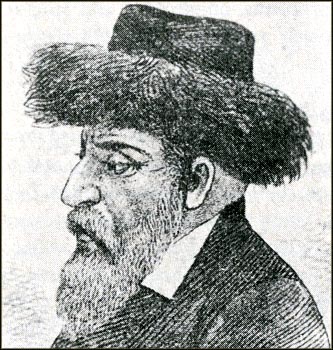
1. The Vizhnitsa rebbe |
Moshe Dov had a paper too. They went one after the other, on the line to see the rebbe. And Moshe Dov had a wish, his daughter Ethel shall get a real match. So the rebbe said, that's the best match, between both of you. The rebbe was the shadchan.
So my grandfather Yosef Leib came up and said to my grandmother Leah, you know, Hersh Eliyah is engaged. I found for him a kallah. He never saw the kallah. He never saw his wife until he got married. And he loved her. It was really something out of the ordinary for the time.
Yankel (Jacob) Wiesenthal (1978)
THEY MET AT A SKALA LANDSMANSHAFTN DANCE
Jacob Wiesenthal and Ida Waxman-Einbinder: 1917
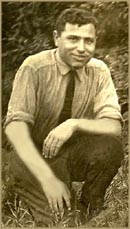
2. Jacob Wiesenthal
(ca. 1913) | There was a Skala dance during the first World War. So I gave the dance. I paid the money for the dance, because we took a bigger hall. And we advertised the big ball in Ramick Hall on 55th Street. So I was the manager from that, to make a few dollars to send to Europe. We had raffle tickets to give out to make a few dollars. We raffled off candy. And we had a bar which people went to. They took a drink and they paid and that's the way we got a few dollars. I won the box of candy there. When I won that box of candy, I walked over to my cousins, the Menchels. There was Elsie, Chana, and Rose Menchel, three sisters. So I gave it to them, the box of candy. Yankel (Jacob) Wiesenthal (1978) |
Ida was a friend of our friend Gussie and we became very good, close friends with her. There was a dance from the Skala society, from where we come. The dance was in a big hall. So Ida wanted to go to the Russian [Kalarasher Bessarabian Society, her landsmanshaftn] ball. We promised her that if we wouldn't like it there, we'll go wherever she wants. She was a beautiful girl and she sang beautifully. She had a very good voice.
Chana (Annie) Menchel (1978)
And when I came over, I saw a girl standing with them. They introduced her to me and they saw I was talking, dancing with people. I was a good dancer. And Ida said, "Who's that shlumiel?" Me. They said, "Don't call him a shlumiel. He is the finest boy there is. You know, this party is paid for by him." Cost maybe twenty-five dollars. I looked on her, she was a beautiful girl, so I went over and I took her for a dance. After we danced, she said to me, "You'll take me for another one?" She liked it. Then, naturally, I took her for more than one dance more. I took her for maybe ten dances afterwards because I got a liking to her. She was a nice looking kid. Then after the ball was over, I took her to a restaurant and then to her home. I came up one Friday night to her mother and her father. It was shabbas. And I started to talk to her father and mother and we got married.
Yankel (Jacob) Wiesenthal (1978) |
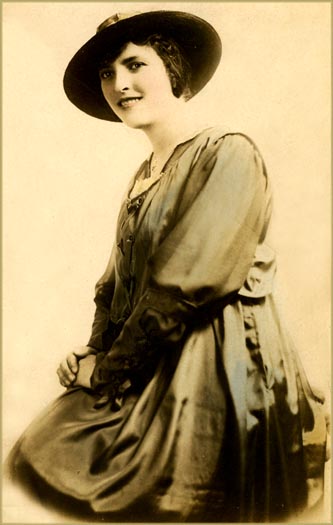
3. Ida Waxman-Einbinder
(ca. 1916) |
SHE CAME TO SKALA TO FIND A HUSBAND
Moshe Efraim (Morris) Wiesenthal and Sarah: 1929
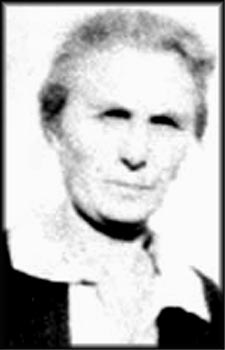
4. Brucha Wiesenthal, mother of Morris
(ca. 1929) | My wife Sarah came as a young girl to America and her brother was here. And she struggled and then somebody, a landsman, took her over and taught her the tucking trade. And as soon as she started to make tucking, she started to make money. She was very frugal and she saved. Then she and her brother made a business making fringes on shawls. There was a fire and they got a lot of money. So she came to Europe to look for a husband. She had about five, six thousand dollars. And when I heard she had five thousand dollars, I thought it was a fortune of money. |
I was 29 or 30 years old, living in Skala, and I saw I had no future in that little town. And then somebody told me that a woman from America was in the farmer's market. So I went to look at her and I took my mother. My wife used to tell me all the time, she didn=t like me in the beginning. She liked my mother more than she liked me, because my mother was more progressive.
I saw her and I liked her. I called the guy in my town, the shadchan [matchmaker] and I said, you know, I would like to meet that woman again. And they put together a shidduch. We made an engagement party. Then my father and mother said to my wife, with that money you have, we could open up a big business in Skala. And my wife said, nothing doing. We got married in 1929. They made a big wedding in Skala. Then we went to America. I had a store, made a living. Sarah helped me all the time. Forty-seven years married: my wife stood with me twenty-four hours a day.
Moshe Efroim (Morris) Wiesenthal (1978) |
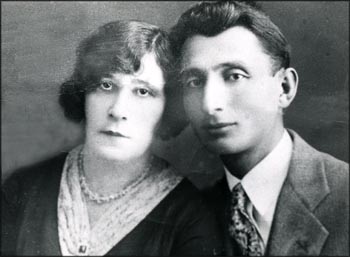
5. Sarah and Morris Wiesenthal (1929) |
Text and photographs 2-5 copyrighted by Helene Kenvin
This page created by Max Heffler
Updated Sep 15, 2006. © Copyright 2005 Skala Research Group. All Rights Reserved.
